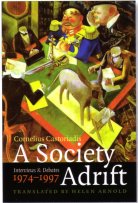A society adrift - Interviews and debates 1974-1997
Escobar Enrique, Gondicas Myrto, Vernay Pascal, (éd), 2009, New York, Fordham University Press, 240pp.

For this political thinker and longtime militant (co-founder with Claude Lefort of the revolutionary group “Socialisme ou Barbarie”), economist, psychoanalyst, and philosopher, two endless interrogations—how to understand the world and life in society—were intertwined with his own life and combats. An important chapter discusses the history of “Socialisme ou Barbarie” (1949—1967); in it, Castoriadis presents the views he defended, in that group, on a number of subjects: a critique of Marxism and of the Soviet Union, the bureaucratization of society and of the workers’ movement and the primacy of individual and collective autonomy. Another chapter presents the concept, central to bis thinking, of “imaginary significations” as what make a society “cohere.” Castoriadis constantly returns to the question of democracy as the never-finished, deliberate creation by the people of societal institutions, analyzing its past and ifs future in the Western world. He scathingly criticizes ‘representative” democracy and develops a conception of direct democracy extending to all spheres of social life. He wonders about the chances of achieving freedom and autonomy—those requisites of true democracy—in a world of endless, meaningless accumulation of material goods, where the mechanisms for governing society have disintegrated, the relationship with nature is reduced to one of destructive domination, and, above ail, the population bas withdrawn from the public sphere: a world dominated by hobbies and lobbies—”a society adrift.”
Translator HELEN ARNOLD participated for several years in the “Socialisme ou Barbarie” political group along with Castoriadis, co-founder of the group. She has also translated his Figures of the Thinkable.
